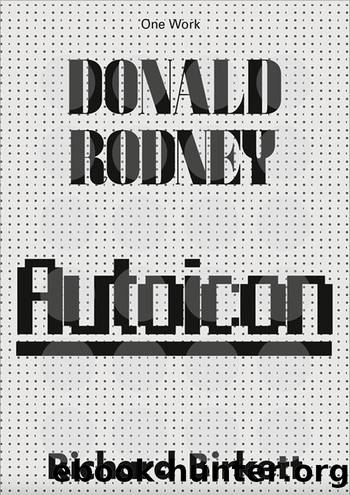Donald Rodney by Richard Birkett

Author:Richard Birkett [Birkett, Richard]
Language: eng
Format: epub
Publisher: MIT Press
Published: 2023-05-09T00:00:00+00:00
Object, memory, fabula
In his often-quoted study The Language of New Media (2001), Lev Manovich outlines two parts to the computer's ontology: the data structure, as âcollections of individual items, with every item possessing the same significance as any otherâ; and the algorithm, as âa sequence of simple operations that a computer can execute to accomplish a given taskâ. While data structures and algorithms âare equally important for a program to workâ, Manovich sees these ontological parts as corresponding to distinct cultural forms of the computer age: âCD-ROMs, Web sites and other new media objects organized as databases correspond to the data structure, whereas narratives, including computer games, correspond to algorithmâ. The database form, mirroring real-world collections such as libraries, archives and museums, privileges the goal of information access, while the narrative form â clearly aping the cinematic in the navigable 3D space of computer games â centres âpsychological engagement with an imaginary worldâ. In the sphere of computer culture, for Manovich, the database form supersedes that of the narrative to the extent that all new media objects âcan be understood as the construction of an interface to a databaseâ.145 The database is the foundation, and the user â whether interacting with a website search tool or a computer game â is called to engage with and consciously âperformâ the algorithm by which the data is accessed. For Manovich, database and narrative are ânatural enemiesâ â the representation of the world as an unordered list versus a âcause-and-effect trajectory of seemingly unordered items (events)â. Ten years after his study, N. Katherine Hayles reframed this relationship as that of ânatural symbiontsâ. In her articulation: âIf narrative often dissolves into database ⦠database catalyzes and indeed demands narrative's reappearance as soon as meaning and interpretation are required.â In the face of the exponential increase of information and data brought about by the Internet, the form of the database has an advantage over narrative inthat new elements can be added to existing databases without disrupting any ordered trajectory. But for Hayles:
The flip side of narrative's inability to tell the story is the proliferation of narratives as they transform to accommodate new data and mutate to probe what lies beyond the exponentially expanding infosphere. No longer singular, narratives remain the necessary others to database's ontology, the perspectives that invest the formal logic of database operations with human meanings and gesture toward the unknown hovering beyond the brink of what can be classified and enumerated.146
Download
This site does not store any files on its server. We only index and link to content provided by other sites. Please contact the content providers to delete copyright contents if any and email us, we'll remove relevant links or contents immediately.
| Ancient & Classical | Arthurian Romance |
| Beat Generation | Feminist |
| Gothic & Romantic | LGBT |
| Medieval | Modern |
| Modernism | Postmodernism |
| Renaissance | Shakespeare |
| Surrealism | Victorian |
4 3 2 1: A Novel by Paul Auster(11088)
The handmaid's tale by Margaret Atwood(6887)
Giovanni's Room by James Baldwin(5911)
Big Magic: Creative Living Beyond Fear by Elizabeth Gilbert(4745)
Asking the Right Questions: A Guide to Critical Thinking by M. Neil Browne & Stuart M. Keeley(4612)
On Writing A Memoir of the Craft by Stephen King(4233)
Ego Is the Enemy by Ryan Holiday(4013)
Ken Follett - World without end by Ken Follett(3985)
The Body: A Guide for Occupants by Bill Bryson(3843)
Bluets by Maggie Nelson(3736)
Adulting by Kelly Williams Brown(3691)
Guilty Pleasures by Laurell K Hamilton(3608)
Eat That Frog! by Brian Tracy(3538)
White Noise - A Novel by Don DeLillo(3447)
The Poetry of Pablo Neruda by Pablo Neruda(3380)
Alive: The Story of the Andes Survivors by Piers Paul Read(3327)
The Book of Joy by Dalai Lama(3245)
The Bookshop by Penelope Fitzgerald(3242)
Fingerprints of the Gods by Graham Hancock(3233)
